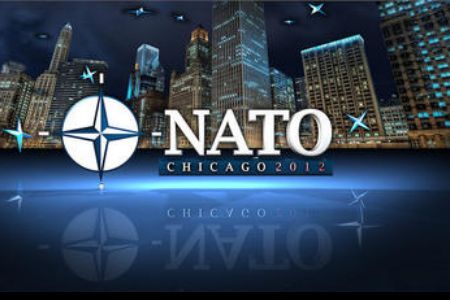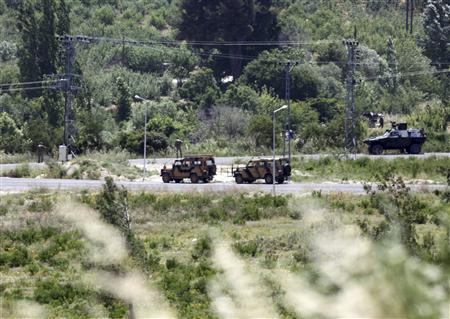US President Barack Obama and NATO allies will focus Monday on logistical aspects of ending the protracted Afghan war after President Hamid Karzai vowed his country will no longer be a “burden” for the international community.
Pakistani President Asif Ali Zardari’s attendance at the summit here had raised hopes his government was ready to lift a blockade on NATO convoys, but talks on reopening the routes have stumbled over Islamabad’s demand to charge steep fees for trucks crossing the border.
Zardari and leaders from some 30 other nations and international organizations will join the 28 NATO allies for Monday’s second day of talks.
Leaders of the 28 NATO nations stood in solemn silence as a bugler’s lament recalled the heavy cost of a conflict that has killed over 3,000 coalition soldiers, maimed thousands more and left tens of thousands of Afghans dead.
As anti-war protesters clashed with police near the Chicago summit site, the two-day talks aimed to endorse a withdrawal strategy and seek firm commitments from allies to train and bankroll Afghan forces.
Before the summit Obama held talks with Karzai, three weeks after his dramatic trip to Kabul where the two leaders inked a security pact for going forward after the last 130,000 international troops withdraw in late 2014.
“We’re confident that we are on the right track, and what this NATO summit reflects is that the world is behind the strategy that we’ve laid out,” said Obama, who faces a tough re-election in November.
But in a sign of growing impatience within the alliance, new French President Francois Hollande refused to back down from his decision to pull troops out in 2012, a year earlier than planned.
“I told everyone I spoke with that this was not negotiable because it was a question of French sovereignty and everyone understood,” he said, adding France would continue to train Afghan forces after 2012.
Karzai said his country no longer wanted to be a “burden,” urging the international community to complete a security transition to his Afghan forces.
“Afghanistan… is looking forward to an end to this war and a transformational decade in which Afghanistan will be working further for institution building and the development of sound governance in the country,” he said.
Along with reaffirming the 2014 deadline, the summit is expected to back Obama’s plan to cede the lead in combat missions to Afghan troops next year, while making a commitment to securing $4 billion annually for Afghan forces.
“Once the Afghans have full responsibility by the end of 2014, our combat mission will come to an end but we will not walk away,” said NATO Secretary General Anders Fogh Rasmussen.
A Western official told AFP Sunday that nations with troops in Afghanistan had pledged roughly $1 billion to bankroll Afghan security forces after 2014. The bulk of the funding is expected to come from the United States.
In a sign of the waning appetite for further conflict, Rasmussen said the Western defense alliance “has no intention to intervene” in Syria despite concern at the bloodshed there.
“We strongly condemn the behavior of the Syrian security forces and their crackdowns on the Syrian population and we urge the Syrian leadership to accommodate the legitimate aspirations of the Syrian people,” he told reporters.
The summit in Obama’s hometown went ahead under a massive security operation as normally bustling Chicago streets were deserted.
Boats with machine guns patrolled a river near Obama’s hotel and police enforced a wide security perimeter around the conference center.
Thousands of protestors have taken to the streets in recent days calling for an end to war. Although the rallies have been largely peaceful, scuffles broke out Sunday when some hardcore demonstrators refused police orders to disperse.
The NATO talks come against a backdrop of a changing geopolitical landscape for the 63-year-old organization also grappling with shrinking defense budgets.
Leaders on Sunday launched the first phase of a US-led missile shield for Europe and sought to appease Russian anger over the system by renewing an invitation to cooperate.
Obama and fellow leaders also agreed on a slew of some 20 joint projects to pool military hardware as part of a so-called “Smart Defense” initiative.











